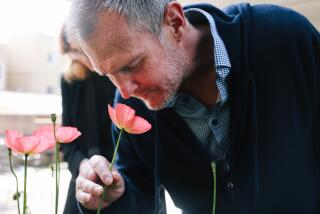Disability and Its Attendant Problems
- Share via
I wasn’t the first person to dive into the lake that day. One after another, we went to the end of the dock and took the leap. But I was the one who broke my neck.
It was the summer after my junior year of college, and for more than a month after it happened I barely spoke. I lay in a hospital bed and assumed my life was over. I refused to participate in therapy or the many activities organized by the hospital. When my doctor pushed me about plans for what I’d do next, I said I no longer had aspirations. None of the things I imagined a quadriplegic could do interested me. I had no real wish to live.
But there were these two guys in wheelchairs. They visited me often, although I rarely spoke to them. They were upbeat about their disabilities, which seemed absurd. Finally, about a week before I was discharged, I listened to them for the first time. They told me they were going to college. “How?” I demanded. How could quadriplegics go to college? “With an attendant,” one of them answered. I was so ignorant about the new world I’d entered that I had to ask, “What’s that?” He said, “It’s a student who’s paid to give me a shower, help with my bowel and bladder program and get me up in the morning, like the nurses are doing now.” They finally had my interest.
Still, when my parents loaded me into the car like a sack of potatoes to leave the rehab hospital, I hoped that someone in my new life would be thoughtful enough to take me out for an occasional drive. Now my car is the last one in my apartment garage most nights. In the years after leaving the hospital, I finished college, got a master’s degree, got married (and later divorced) and held many jobs, including as a news and public affairs television producer, a rehabilitation counselor, a stand-up comedian, a television actress and a disability rights activist.
At 52, I’m convinced that my life has been fuller than it would have been if I’d never been injured. But my success has hinged on one thing: I’ve always lived in states that supported my having an attendant.
I lived in Illinois when I broke my neck. A couple of states away, in Ohio, people who had accidents less serious than mine were sentenced to nursing homes for life. Disabled teenagers shared rooms with elderly people who were terminally ill. Many died young.
In 1999, the U.S. Supreme Court ruled in the case of Olmstead vs. L.C. that segregating people with disabilities was illegal, a decision that paved the way for increased governmental support for in-home attendants.
If only that were the end of the story. In California today, 74,000 people face the possibility of losing their attendants -- a development that flies in the face of Olmstead and could force many into nursing homes. Many more disabled people are facing cutbacks in payments for their attendants.
Currently the state pays for family members to provide care to their disabled parents, children or spouses. This has enabled many people to be cared for by those who love them most. But the federal government, which ordinarily picks up half the cost of attendants for people with disabilities, won’t pay its share if the attendant is a family member.
Now, as part of his attempts to balance California’s budget, Gov. Arnold Schwarzenegger is threatening to end the program unless the feds grant the state a waiver that would allow such arrangements. He has also threatened to stop paying for some of the most severely disabled because the federal government won’t pay into the system that California has arranged to make payments directly to disabled people if they have multiple attendants to pay.
The rest of us with attendants aren’t as directly threatened, but there is a proposal to cut state attendant payments back to the minimum wage and to eliminate health benefits for them. This would make finding competent help much more difficult.
Such actions are shortsighted. Not only is it quite likely that the state will end up paying for more-expensive institutional care for many people now able to live independently; it’s also a near certainty that many people who are productively employed assisting those of us who need help will be suddenly unemployed and need public assistance.
I remember life before they raised payments to attendants six years ago. Finding and keeping help was a constant struggle. One caretaker I had was schizophrenic. Another refused to leave my house after I fired her. I have friends who were robbed by their attendants.
I need someone to put me to bed at night. I can’t get into my wheelchair in the morning without being lifted. I am utterly dependent on the people who work for me. I have wonderful attendants, but I’m afraid that I’ll lose them if I have to cut them back to minimum wage and take away their health insurance. We are all hanging on by our fingernails as is, and we do it willingly to stay out of nursing homes. But we simply can’t make it if any more is cut.
Two decades ago, I was part of a group demonstrating to get a wheelchair for a man who, because of bureaucratic red tape, was bedridden and dying of bedsores and pneumonia. I will never forget what a bystander said as we took the man from City Hall on the gurney that had been his only conveyance for three years. She said, “If he can’t have a wheelchair, why am I paying taxes?” Isn’t taking care of the citizens least able to care for themselves a reason we pay taxes?
I sit on Los Angeles County’s Personal Assistance Services Council. A colleague of mine on that commission, a prominent Los Angeles attorney, sent a letter recently to Schwarzenegger. “You, Gov. Schwarzenegger,” he wrote, “are forgoing your salary in this budget crisis. I too am able to help through taxes, yet no one is asking people like me to pitch in in this crisis.”
It might have cost the state less if I’d gone to a nursing home when I was 20, because I probably would have died at 25. But is that really the way we want to save money?


